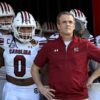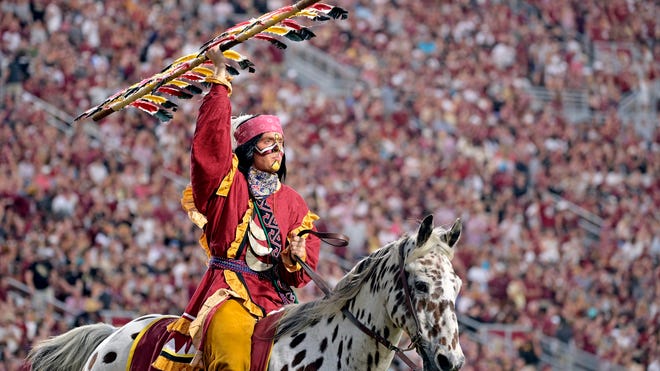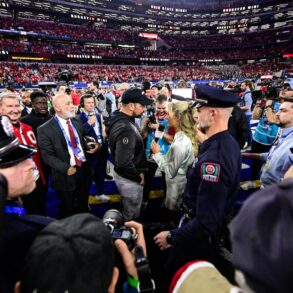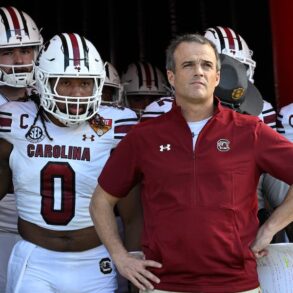Not everyone is happy with college football’s current system.
Rapid realignment, NIL (name, image and likeness) and the transfer portal have made only 25 or so Football Bowl Subdivision programs relevant out of the 136-school FBS structure. Even at Florida State, the days of watching and cheering on your favorite player over 3-to-5 years are probably gone, too. And, the price tag to attend a game in person across the nation continues to rise and rise.
Is all this sustainable for the long term?
“College sports is over,” FSU fan and alum Louis Hernandez said. “Last time I looked, pro teams don’t have boosters.”
FSU boosters, fans and alumni can certainly relate to Hernandez’s take on today’s landscape. Not helping the mood was the Seminoles‘ historic splat that saw them finish the season 2-10 a year after winning the Atlantic Coast Conference championship and going 13-1.
However, coach Mike Norvell is aggressively trying to reboot the program. He has fired and hired coaches and is deep into roster management entering the offseason. Each step has offered signs of hope for fans.
Norvell’s recently restructured contract also reflected a one-time voluntary salary reduction of $4.5 million that will be utilized to launch the Vision of Excellence initiative that’s earmarked to help the overall student-athlete experience. Even Norvell’s chance to earn the money back over the length of his contract that expires in 2031 translates into a result that everyone wants:
Winning.
More importantly, there remains a core belief that the Seminoles will overcome any challenges as the powers-in-place in college football attempt to solve a myriad of issues. This includes identifying a system that still somehow emphasizes education; creating a fair revenue-share program for all players; or the Power Four potentially creating their own governance structure within the NCAA.
If any of it is remotely possible.
“Fans have long memories …. let’s not forget how we got here,” FSU graduate and Colorado resident Jim Pennington said of Seminole changes. “All of us are in this together.”
More:Seminole Boosters continue meetings to discuss seating options, stadium upgrades
FSU has gone all in to remain among the nation’s elite across athletics
First, FSU is not financially poor.
Its brand is stout.
In fact, the Seminoles received the most money in donations from 2005 to 2022 in the Atlantic Coast Conference at $540 million, according to a 2023 report by the USA Today and the Knight Commission.
Still, not many programs have equal footing.
FSU’s tally trailed Florida by $223 million and national leader Oregon by $429 million. Flip the coin, it led fellow ACC members Virginia by $24 million and Clemson $64 million. And Memphis, which upset the Seminoles at Doak Campbell Stadium this season, was the only Group of Five school in the top 50 over the last 17 years at 50th with $170 million.
Even while FSU has affluent fans and generous alumni across all levels, everyone is being asked to dig deeper. It’s a more difficult ask locally. The median family income for the Tallahassee metro area was $88,700 in 2023, according to the Census Bureau’s 2019-2023 Five Year American Community Survey. Some local fans say they are being squeezed out by rising ticket prices.
“I’ve been raised on Seminole football, basketball, baseball and softball all my life, and with all these changes, it breaks my heart that I will have to stop going,” said Lea Ann Myers, 59.
More:FSU coach Mike Norvell must deliver on promise of an ‘immediate, fast fix’ | Jim Henry
Money train keeps rolling to keep FSU athletics elite
Still, the money train must keep rolling.
The Seminoles have gone all in financially with facilities, NIL, transfer portal, coaching salaries and the school’s lawsuit to leave the ACC. Schools in the conference are looking at being more than $40 million behind Big Ten and SEC schools annually in television revenue moving forward.
Michael Alford, FSU’s Vice President and Athletics Director, has been aggressive in his approach to position FSU among the leaders in the new structure of collegiate athletics. As a former collegiate athlete married to a former collegiate athlete and coach – and with three kids in sports – Alford understands the process and is adamant athletics provide student-athletes with an elite experience.
He’s also aware of FSU’s steep climb from its early days.
“From the start, especially in the early years of coach (Bobby) Bowden’s time here, FSU has been like a boxer punching above its weight class,” Alford told the Tallahassee Democrat. “That’s something that really gave this place an identity. And that remains. That could describe our challenges now – they’re big challenges, but we embrace them.”
Naturally, not all of Alford’s decisions have been embraced by FSU supporters. Loud objections have stemmed over the massive $263 million renovation to Doak Campbell Stadium that has included an often dramatic price hike in season tickets and a one-time capital gift contribution for seats in select areas.
Still, Alford is exploring every avenue to pay the bills with a remaining surplus. He also unabashedly continues to encourage Seminoles faithful to contribute however they can. Seminole Boosters, Inc., under President and CEO Stephen Ponder, is also working strategically to ensure FSU teams and student-athletes have all the resources and support to succeed, on and off the field.
“That’s a great testament to the support of our fan base, particularly our donors,” Alford said of the Seminoles’ financial positioning.
“With each passing year that I am here, it drives home the reality that our people truly give to their fullest. So we haven’t taken on these obligations impulsively or in a vacuum. Add on the things nationally that we were anticipating but, yeah, we’re getting it from from all sides right now. But this will pass as we have prepared the program for the future. It’s been a big ask of our donors and our entire support culture.
“But we’re going to succeed.”
Changes not easy, even for FSU’s biggest fans
It’s not easy, but change is necessary to keep up with the Joneses, school administrators say.
It will be interesting to see if future plans maintain the current structure of the Power 4 conferences (the SEC, Big Ten, ACC and Big 12). Enhancing media-rights revenue and improving game inventory (scheduling) are pivotal pieces to the pursuit of more money. Television networks are flexing more control in the decision-making as they pay billions to conferences.
The 12-team College Football Playoff invitational is heavily slanted towards bluebloods. ACC’s two entries – champion Clemson and runner-up SMU, which received the last at-large bid over Alabama – were bounced in first-round games.
It’s not all third-and-long, either.
College football, at the moment, still remains highly popular across the country. There’s a beauty and celebratory vibe to it. It sells tickets and brings fans and communities together. Tallahassee is blessed with two Division I teams in neighbors FSU and Florida A&M. They have proud, winning traditions and dedicated alumni networks. There’s no better scenes than autumn Saturday afternoons/nights at Bragg and Doak.
When it comes to fans in seats and fans watching on television, FSU stands tall.
In 2023, according to D1Ticker.com, 19 programs averaged 70,000 or more fans at home games and seven teams averaged above 100,000. Prior to the start of stadium renovation that dipped capacity to 55,107 this season, FSU ranked 19th in attendance at 78,711. And the Seminoles were still featured in the two most-watched ACC regular-season games in 2024 despite experiencing their worst season in 50 years, according to Nielsen viewership.
So what is college football’s next move?
That’s the million(s) dollar question.
Football’s rich are getting richer and the gap is widening between the haves and have nots under the current system. Players can transfer multiple times in their careers as they seek more NIL money and can play immediately. It’s intolerable coaches must spend precious time recruiting their own players and others at the price of developing them. Leadership, trust, culture and chemistry are vanishing in locker rooms.
“It seems that there have been too many distractions,” Pennington reasoned about FSU’s struggles this season.
College football is walking a fine line between growth and disinterest. Fans can be caught in the middle as they try to support their teams with all of their heart. And a hand on their wallets.
It’s all left some of FSU’s most loyal fans doing serious soul searching.
Mark Zeigler, a popular senior lecturer who bleeds Garnet and Gold, recently took to Facebook with a gut-wrenching testimonial from a decades-long Booster. He wrote how he was priced out of his beloved west side seats after the renovations after a lifetime of supporting the Seminoles
“I first joined the boosters in high school and I sent them my lawn mowing money. I couldn’t buy season tickets then due to living 6 hours away, but I wanted to be a part of the team,” he wrote.
“I know we are going through growing pains, but I was attracted to FSU long ago by the loyalty of the fans and the charm of being the “little guy. How can we still be good to our fans without alienating so many loyal folks? I don’t have answers, but surely we can do better. I also want to be part of the solution to the team. …
“I love this place too much to just sit idly by.”
This post was originally published on this site be sure to check out more of their content.









